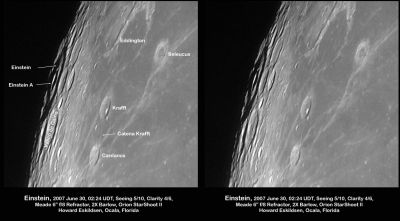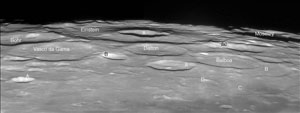Einstein
Contents
Einstein
|
Lat: 16.6°N, Long: 88.5°W, Diam: 170 km, Depth: 1.85 km, Rükl: 17& VIII, pre-Nectarian |


Left: Howard Eskildsen Right: Damian Peach
Images
LPOD Photo Gallery Lunar Orbiter Images
Maps
(LAC zone 37D4) USGS Digital Atlas PDF
Description
Inner crater, Einstein A, is 51 km in diameter (IAU diameter, adopted from NASA RP-1097 in 2006, confirmed by LTVT measurement - Jim Mosher).
Description: Wikipedia
Additional Information
- Depth data from Kurt Fisher database
- Westfall, 2000: 1.85 km
- Lunar Orbiter III - at the end of its successful mission - crashed into the southwest edge of Einstein in 1967.
- Coordinates and diameter are from Rükl The Moon, which in turn appear to have been copied from NASA RP-1097. The IAU values are: Lat: 16.3°N, Long: 88.7°W, Diam: 198 km. Careful measurement of Lunar Orbiter frames IV-187M, IV-188M, IV-190M and IV-188H with LTVT register to the 1994 ULCN suggest that the RP-1097 values are better, although the center longitude is perhaps 88.4 W. Einstein's rim crest appears highly eroded in the Lunar Orbiter views, so its diameter is poorly defined, but again the RP-1097 value seems better. Where the IAU diameter of 198 km came from is not known. - Jim Mosher
- Central peak composition: A (Tompkins & Pieters, 1999)
- Einstein A: TSI = 30, CPI = 30, FI = 25; MI =85 Smith and Sanchez, 1973
- The central crater, Einstein A, is catalogued as a typical Floor Fractured Crater (FFC), but... one should take a look at the floor of the larger surrounding main crater Einstein to detect lots of small unnamed FFCs! - DannyCaes Aug 18, 2015
Nomenclature
- Albert Einstein (March 14, 1879 – April 18, 1955) was a German-born theoretical physicist who is best known for his theory of relativity and specifically mass-energy equivalence, E = mc2.
- Name originally proposed by Wilkins for Simpelius D but not accepted by IAU; shifted to a different crater in Rectified Lunar Atlas (1963) and approved by IAU in 1964 (Whitaker, 1999, p235).
LPOD Articles
Rarely Seen Genius. LPOD (Repeat 5/19
Happy Birthday, Einstein
Accidental concentricity
Einstein Times Two
Bibliography
Albert Einstein in the Sourcebook Project (William R. Corliss)
- In Mysterious Universe, a handbook of astronomical anomalies (1979) :
- Page 70: A Tenth Planet? (Chemistry, 1971).
- Page 612: Was there really a Big Bang? (G.Burbidge, Nature, 1971).
- Page 623: The Geritol Universe: Tired Light (Science News, 1975).
- Page 660: Motion of the Earth through the Ether (Science, 1925).
- Page 661: Ether Drift Experiments (Dayton C. Miller, Nature, 1926).
- Page 670: Aether Drift Detected At Last (Michael Rowan-Robinson, Nature, 1977).
- Page 671: Objections to the Theory of Relativity (Journal of the British Astronomical Association, 1922).
- Page 674: The Einstein Shift - An Unsettled Problem (F.Schmeidler, Sky and Telescope, 1964).
- Page 690: Newton's Apple Fell Faster (New Scientist, 1975).
- Page 694: Light Velocity Dependent on Speed of Source? (New Scientist, 1962).